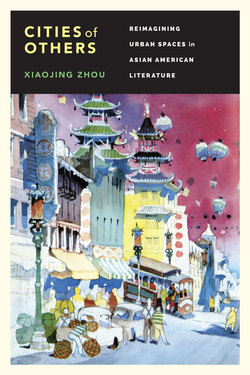Читать книгу Cities of Others - Xiaojing Zhou - Страница 7
На сайте Литреса книга снята с продажи.
ОглавлениеACKNOWLEDGMENTS
THIS BOOK GREW OUT OF THE CONVERGENCE OF DIFFERENT BUT interconnected lines of inquiry over the course of a decade. At various stages of its development I have been inspired by numerous scholars and writers whose work continues to invigorate my thinking, pushing me to explore new areas and enabling me to discover unlikely connections. Most are named in my citations of their writings throughout these pages. Some others, however, whose works are not directly referred to in this book but have been crucial to its genesis, must be acknowledged here. Giorgio Agamben’s Homo Sacer: Sovereign Power and Bare Life was pivotal in the early development of my thinking about the politics of body and space. Li-Young Lee’s poems about refugees, immigrants, and racial minorities in the city called my attention to the possibilities of reimagining and re-representing the American city and its “Others.” Lawson Fusao Inada’s writings about Japanese Americans in confinement during World War II enhanced my understanding of the importance of rethinking the nation-space. Andrew X. Pham’s Catfish and Mandala: A Two-Wheeled Voyage through the Landscape and Memory of Vietnam helped me better understand the intersections of race, gender, sexuality, and class in the multilayered displacement of Vietnam War refugees and their children in the American metropolis.
The communities and their leaders I encountered during my research in California Chinatowns in Locke, Los Angeles, San Francisco, and Weaverville have also inspired me. Locke, established by Chinese workers near the levee they built along the Sacramento River after their town at Walnut Grove burned down, is especially important to my learning about history and geography. Connie King, a descendent of one of the original Chinese families in Locke, was a driving force in having a memorial park built and dedicated to its founders. Locke enables me to recognize the importance of space for exclusion and isolation and for resistance to assimilation, invisibility, and historical erasure and amnesia.
My colleagues at University of the Pacific have been a nurturing source for my aspirations. The late Robert Cox showed me Chinatown in Stockton, where Maxine Hong Kingston lived. Camille Norton introduced me to Locke, taking me there and sharing her powerful poem about its historical museum and Chinese school. Cynthia Dobbs spent time reading part of the manuscript and offered insightful comments and suggestions. I am also grateful to Eric Sonstroem for his enthusiastic support and to Jeffrey Hole for sharing his insights on the connections between the nation-sate and empire. My gratitude also goes to University of the Pacific for research fellowships that helped support my research.
My heartfelt thanks go to the editorial team at the University of Washington Press. It has been a pleasure working with them, particularly Ranjit Arab, senior acquisitions editor, Mary Ribesky, assistant managing editor, and manuscript editor Jane M. Lichty, whose impeccable professionalism I deeply appreciate. To Kukhman Sandhu, I express my sincere appreciation for her hard work in indexing this book.
This book would have remained an unfulfilled aspiration without the unconditional support of my family, especially my husband. Finally, I dedicate this book to my sisters and my brother, who still live in the city where our family began, one that during our lifetimes they have witnessed being transformed from an isolated, idyllic city into an international metropolis that draws people of every description from across Asia and around the world.
